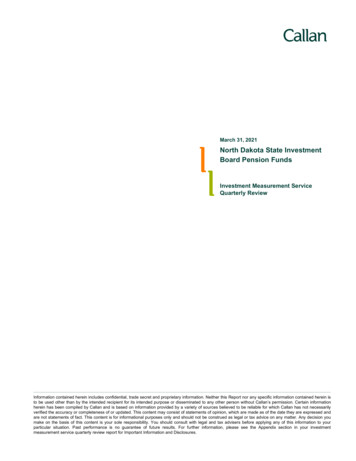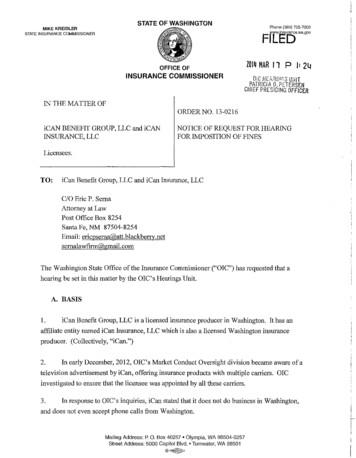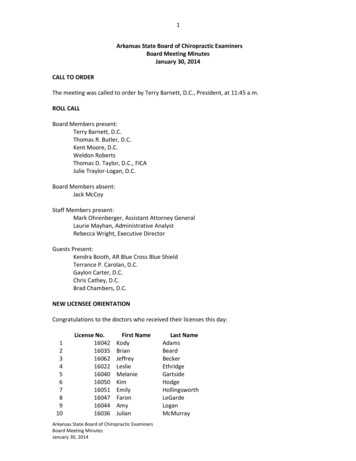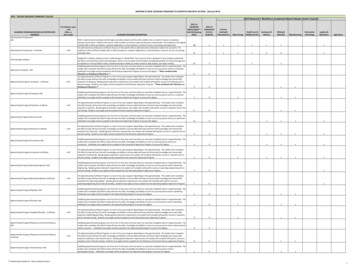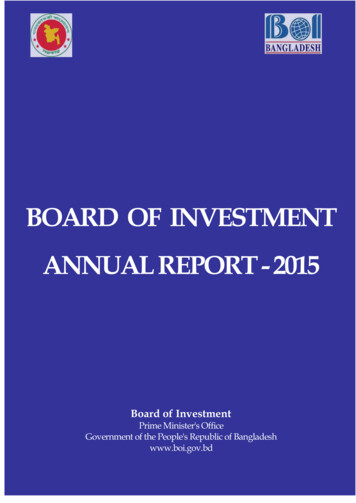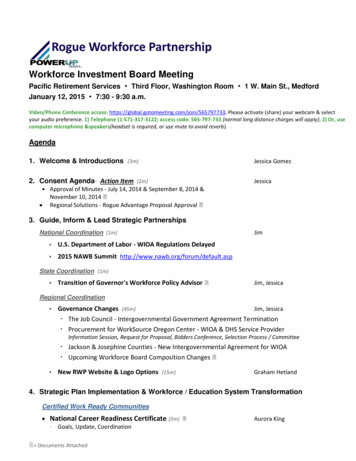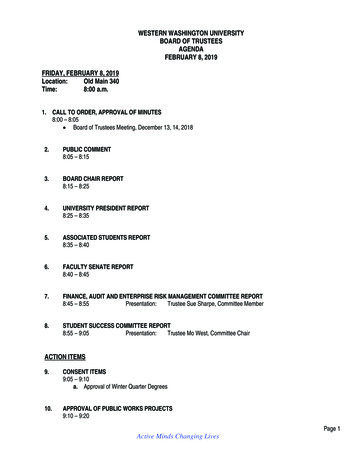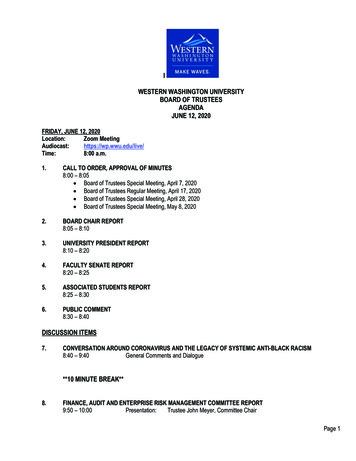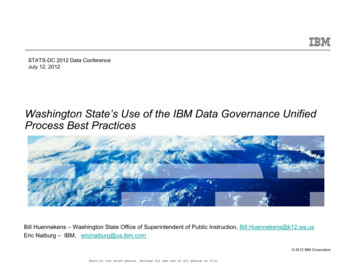
Transcription
JUNE 30, 2020WASHINGTON STATE INVESTMENT BOARDINVESTING IN WASHINGTONWhile the Washington State Investment Board con nually seeks the best investment opportuni es no ma er where theymight be located worldwide, the state of Washington is home to many tremendous companies that offer the WSIB excellentinvestment opportuni es. Many Washington investments can be found in all of the WSIB’s investment por olios.The Economically Targeted Investment (ETI) Policy was adopted by the WSIB in March 2003 to confirm that the InvestmentBoard will con nue to seek quality investment opportuni es in Washington state in accordance with established policies,statutory mandates and fiduciary du es.The ETI policy directed WSIB staff to providean annual progress report to the Board,beneficiaries, the Legislature and the Governoron Washington-based investment ini a vesinvolving the WSIB, its private equity GeneralPartners, and other groups and organiza onsworking to improve economic opportunity andgrowth statewide.Public Equity 2,095.2Fixed Income 197.7Innovation 13.8Tangible Assets 402.8Private Equity 429.6Real Estate 1,057.6Note: The private equity and real estate totals are WSIB’s propor onal share of the es mated fair market value of fund and property investments heldby partnerships in which the WSIB par cipates.
Washington State Investment BoardWashington State Investment BoardEconomically Targeted Investments Policy2020 Annual ReportApril 15, 2021
Washington State Investment BoardIntroduction and SummaryAt the core of the Washington State Investment Board’s (WSIB or the Board) risk managementprogram is the fact that we build globally diversified investment portfolios. As ofSeptember 30, 2020, the Board managed 152.6 billion in 38 funds investing on 6 continents, in85 countries, within 47 currencies, and over 16,000 investment holdings. The Board conducts itsinvestment activities in accordance with investment policies and procedures designed to maximizereturn at a prudent level of risk. Asset allocation explains over 90 percent of the variability ofreturn. Accordingly, the WSIB invests in global asset classes including public equity, fixed income,real estate, tangible assets, and private equity to help control risk and ensure stronger overallperformance.This is the eighteenth annual report on the WSIB Economically Targeted Investments (ETI) policy.This year’s annual poll of the WSIB’s private equity general partners’ (GPs) deal flow activity forthe year ended September 30, 2020, shows continued interest and activity. Key findings includethe following: 25 GPs looked at 316 Washington-based investment opportunities.101 investment opportunities were still under consideration as of September 30, 2020.19 investments were completed.Venture capital and private equity firms continue to look at investments in the region.Washington is rich with investment opportunity and has earned the interest of, and access to, topquality GPs. The WSIB’s GPs continue to actively seek quality Washington-based opportunities,and investments are being made in Washington-based companies.The WSIB believes the state of Washington is an excellent place in which to invest a portion of thetrust funds under management by the Board. As of June 30, 2020, 4.2 billion in value was held inthe WSIB investment portfolio in Washington-based investments through its public equity, fixedincome, real estate, tangible assets, innovation portfolio, and private equity investment programs.Each investment was made consistent with the WSIB’s statutory mandate. This 4.2 billioninvestment in Washington represents approximately 3.8 percent of the state’s Commingled TrustFund (CTF), while the state’s gross domestic product (GDP) is only 0.7 percent of the GDP for theinvestible universe within which the WSIB invests. Private equity commitments of 18 billion haveyet to be called, representing significant capital ready to be put to work as qualified investmentopportunities arise. Further, the Washington-based investments made by the WSIB’s GPssignificantly leverage additional capital from other sources to be put to work in the state.The WSIB has made a strong commitment to facilitate access to and awareness of quality in-stateinvestment opportunities. Further, it has devoted resources to implement that policy and to trackin-state investment activity. The WSIB continues to interact with regional partners to assistWashington companies to achieve exposure to appropriate potential sources of capital.Overview of PolicyThe WSIB’s private equity portfolio originated in 1981 and is invested in limited partnerships. Eachpartnership, which is managed by a GP, acquires or creates ongoing businesses or operatingcompanies at the discretion of the GP. Ultimately, the companies are sold in the public market orto strategic or financial buyers, and only then can the true return on investment be accuratelymeasured. To meet return and plan objectives, the WSIB’s private equity portfolio has diversifiedinvestments in a broad cross section of sub-sectors, industries, and geographic regions, includingWashington and other Northwest states.Page 2
Washington State Investment BoardIn March 2003, the Board adopted an ETI policy to communicate the roles and responsibilities ofthe WSIB relative to such initiatives. ETIs are defined in this instance as investments having theprimary objective of investment return to pension trust fund assets with the possible collateraleffect of assisting the regional economy and the economic well-being of the state of Washington,its localities, and its residents.In the ETI policy, the Board reiterated its “fiduciary duty to invest and to manage the entrustedfunds in a manner consistent with statutes, regulations, Board policies, and the highest standard ofprofessional conduct for the exclusive benefit of fund beneficiaries.” The Board has establishedwritten policies and procedures for all its investments “designed exclusively to maximize return at aprudent level of risk.” The Board will continue to seek quality investment opportunities within thestate in accordance with its established policies, statutory mandates, and fiduciary duty.The Board requests its private equity GPs report annually on Washington-based investmentsevaluated during the prior year. Private equity investments include securities that are generallynot listed on a public exchange and are not easily accessible to most individuals. Theseinvestments range from initial capital in start-up enterprises to leveraged buyouts of maturecorporations. Private equity investments are typically long-term commitments that may last up to12 years or more. Although less liquid, and perhaps riskier than publicly traded investments,private equity investments can offer higher returns than traditional public equity and are anattractive asset when employed as part of a larger, balanced portfolio.The Board established a staff role to facilitate the exchange of information between its privateequity GPs and appropriate parties with knowledge of quality in-state investment opportunitiesand, in accordance with the ETI policy, provide this annual report of relative activities to the Board,beneficiaries, Legislature, and Governor.Investment EnvironmentAlthough the WSIB portfolio comprises asset classes other than private equity, much of thefollowing report focuses on private equity, including venture capital. This is due to the fact that thepolicy reporting is focused only on private equity, and much of the in-state investment activity ofinterest has been focused on the venture capital arena.One way to view the investment environment is to start with a view from the top down anddescribe the climate at the national level, along with industry specific and investment stageindicators. Since the economic downturn in 2008 and 2009, venture capital investing in the U.S.has generally been strong and growing overall. However, the upward trend has been interruptedperiodically by political or economic concerns. The periods of weakness have typically lasted only aquarter or two, and then been followed by recovery in the venture capital investment pace. Thepace of venture capital investment during the last 7 years has been strong.According to the MoneyTree Report by PricewaterhouseCoopers (PwC) and CB Insights(MoneyTree Report), U.S. venture capitalists invested 36.5 billion in 1,461 deals in the thirdquarter of 2020. The dollar amount was a 30 percent increase compared to the second quarter,while the number of deals completed increased 1 percent. Venture capital investing continues at astrong level and there have now been 28 consecutive quarters in which over 10 billion wasinvested in a quarterly period. During the third quarter there were 88 transactions that had avalue in excess of 100 million and they represented 54 percent of total dollars invested in thequarter. This represents the continuation of the trend of firms remaining private for longer periodsand leading to larger private market funding requirements.U.S.-based venture capital investments during the first 9 months of 2020 were 92.3 billion in4,317 deals. This was an increase of 4 percent on a dollar basis and a decrease of 14 percent forthe number of deals completed compared with the same period in 2019, when 88.5 billion wasPage 3
Washington State Investment Boardinvested in 5,036 deals. The average deal size for this period was 21.4 million compared to theprior year period amount of 17.6 million, reflecting the impact of large transactions.The internet sector received the highest level of funding in the third quarter of 2020, at 12.7 billion and 40 percent of deals completed. Next highest was the healthcare sector at 8 billion and 19 percent of deals completed, followed by mobile & telecommunications at 4.3 billion and 11 percent of deals completed. Deal activity was highest in the quarter for seedstage deals at 414 transactions, which represented 28.3 percent of the total. Early stage dealsrepresented 21.8 percent of total transactions and expansion stage were 21.4 percent. Later stagedeals represented 10.1 percent of deal flow, but due to transaction size were 45.7 percent of thetotal dollar amount invested.As usual, California was the state that received the highest level of funding at 17.8 billion from615 transactions. This represented 49 percent of the dollar amount invested and 42 percent of thenumber of deals completed in the third quarter of 2020. Washington was tied for fourth place forthe number of deals completed at 59, and fifth place for dollar amount invested at 1,183 million inthe period.According to PwC/CB Insights MoneyTree data, for the 12-month period ended June 30, 2020, thenumber of deals done in the U.S., Northwest, and Washington decreased, as compared to theperiod ended June 30, 2019. Regarding dollars invested, the amounts decreased for the U.S.,while increasing nicely for the Northwest and Washington, as compared to the period ended June30, 2019. In the most current 12-month period, venture capital investments in the U.S. totaled 107.8 billion in 5,683 deals, down 16 percent with respect to amount invested and down11 percent for the number of deals. Of that U.S. total, 3,867 million (up 33 percent) was investedin 266 deals (down 5 percent) in the Northwest region (defined as Washington, Oregon, Idaho,Montana, and Wyoming). Washington captured 195 of the Northwest deals (down 8 percent) and 2,872 million of the newly invested dollars (up 17 percent). Venture capital backed transactionsin Washington have exceeded 1 billion in each of the last seven 12-month periods ended June 30,and were above 2 billion in four of those years. Based on the PwC/CB Insights MoneyTree data,capital being invested into Washington-based companies appears to be continuing at an activelevel. During this same time frame, WSIB GPs called 4.9 billion (WSIB’s portion) of capital, aportion of which was invested in Washington-based companies.For the first three quarters of 2020, 228 U.S. venture capital funds raised 56.6 billion, accordingto the PitchBook-National Venture Capital Association Venture Monitor (PitchBook Report). Thisamount compares to 54.9 billion in 470 funds for all of 2019. The pace of fundraising remains ata very healthy level, as 2020 will be the seventh consecutive year in which over 30 billion will beraised by venture capital funds. Funds sized at 500 million or larger have amounted to15.9 percent of all funds raised so far in 2020, up from 6 percent in 2019. As of September 30,2020, there have been 35 funds that closed with a fund size above 500 million which raised atotal of 37.8 billion. The median number of years between funds was at an all-time low of2.3 years and the median time required to close a fund was 12.5 months. Limited partners appearto have a continuing strong interest in venture capital investments.Firms with offices in the Northwest which reported raising funds during 2020 included AcceleratorLife Science Partners (Fund II, 18 million), Bloccelerate VC (Fund I, 12 million), Frazier LifeSciences (Fund X, 617 million), Fuse Venture Partners (Fund I, 67 million), Madrona Venture(Fund 8, 345 million), Madrona Acceleration (Fund 2, 160 million), and Pike Street Capital (FundI, 237 million).An October 2020 report in the Puget Sound Business Journal presented details on the largestventure capital and private equity firms in the Puget Sound region and investment activity in 2019.The 13 firms listed reported a total of 12.1 billion of funds under management. Not all firmsprovided detail on deals done in Washington during 2019, but for those that did report, the totalPage 4
Washington State Investment Boardinvested was 505 million in 124 Washington-based deals. This compares to 18.8 billion of assetsunder management and 324.9 million invested in 127 Washington-based deals from the listpresented last year for 2018.According to a report prepared by Renaissance Capital, during 2020 there were 218 U.S. initialpublic offerings (IPOs), which raised 78.2 billion. This was an increase of 36 percent in thenumber of IPOs and 69 percent in proceeds generated. IPO issuance was reported to have beenled by healthcare at 50 percent of the total, followed by technology at 24 percent. 2020 was also astrong year for IPO alternatives, as Renaissance Capital reported there were three direct listingsand 248 special purpose acquisition company (SPAC) transactions that raised 75.5 Billion. Therewere five IPOs completed by Washington-based companies in 2020: Accolade, Inc., Athira Pharma,Inc., Harbor Custom Development Inc., Silverback Therapeutics, Inc., and Zoom Technologies Inc.This is up from 2019 when one IPO was completed by a Washington-based company. In addition,Porch Group, Inc, became a listed company by means of a SPAC transaction.A review of the 18 billion WSIB private equity overhang by strategy at June 30, 2020, points outthat 79.6 percent of the unfunded commitments are in the area of corporate buyouts. The GrowthEquity/Venture segment was 13.4 percent of the unfunded commitments and Distressed/Co-Investment was 7 percent. Overall the unfunded commitments decreased 0.4 billion, from 18.4 billion last year, reflecting a continued active pace of new partnership commitments duringthe period. The unfunded commitment amount provides substantial capital for new private equityinvestments, including possible Washington-based investments.Portfolio Allocation byStrategy Based on UnfundedCommitments atJune 30, 2020 ( Millions)Discussions regarding Washington-based investments often focus on the dollars WSIB has investedin Washington-based transactions through its GPs. While this is an important amount, it may alsobe useful to expand the perspective to consider the total amounts invested by WSIB GPs inWashington-based transactions. For example, as of June 30, 2020, the WSIB had investedapproximately 680 million as a limited partner through the Private Equity program inWashington-based transactions. However, the total amount invested by WSIB GPs inWashington-based transactions was 11 billion. This amount reflects capital from other limitedpartners and the GPs, which has been invested in the same transactions. The total amountinvested is 16.1x the amount from only the WSIB. The true impact of the WSIB’s investment onthe Washington economy is substantially enhanced by recognizing the total amount invested byWSIB GPs, not simply the WSIB portion.Page 5
Washington State Investment BoardThe Puget Sound has also given rise to the growth and development of numerous businesses andprofessional organizations in the past decade that provide entrepreneurs and small companies withguidance and mentoring, networking, and showcase events to potential investors.It does appear that investment capital is available to support the growth of technology companiesin Washington State and the U.S. Interesting investment opportunities continue to attract dollars,whether from local players or more remote sources.Investments in WashingtonThe WSIB seeks the best investment opportunities no matter where they might be headquartered.The state of Washington is home to many successful companies, and Washington-basedinvestments can be found in many WSIB investment portfolios. The following table reflects asummary of Washington-based investments in the WSIB CTF portfolio at each fiscal year endedJune 30 for the years 2015 through 2020.Washington Investments in the WSIB CTF PortfolioInvestmentClassPublic EquityFixed IncomeReal EstateTangible AssetsInnovationPrivate EquityTotal2015 557.866.3847.923.60.0269.3 1,764.9Value - Fiscal Year Ended June 30 ( millions)2016201720182019 652.366.3906.023.20.0211.1 1,858.9 1,027.5104.91,043.180.80.0190.8 2,447.1 1,169.3100.6985.9112.00.0290.8 2,658.6 1,497.2103.31,132.5254.712.6206.5 3,206.82020 2,095.2197.71,057.6402.813.8429.6 4,196.7Note: Values include Boeing.The WSIB CTF portfolio contains numerous public equity and fixed income investments inWashington-based companies. In the year-over-year comparison, the June 30, 2020, total valuewas up 989.9 million or 30.9 percent. The value of public equities increased 39.9 percent; thiswas due to the strong stock price performance of many large Washington-based companies thatare heavily represented in the passive indices, somewhat offset by reductions in holdings byseveral active managers. The value for fixed income increased 94.4 million, or 91.4 percent, dueprimarily to aerospace industry investments during this period. The 6.6 percent decrease ininvestment value for real estate reflects a combination of acquisitions and dispositions, as well asincreases and decreases in values at the property level. It also reflects, in some cases, changesdue to financing and refinancing activities. The tangible assets investment value increased 148.1 million, or 58.1 percent, due primarily to recent transportation infrastructure investments inWashington state. The Innovation Portfolio now holds several investments in Washington-basedcompanies that were valued at 13.8 million.The 108 percent increase in value year-over-year for private equity was due to 86.2 million newin-state investments combined with substantial appreciation in the fair market value for variouscompanies in the past fiscal year, offset by 15.2 million of proceeds from realizations. As ofJune 30, 2020, the WSIB had 429.6 million of invested value in Washington-based companies inits private equity portfolio, representing approximately 2.8 percent of the total domestic privateequity portfolio value. The fair market value is the value remaining of more than 680.5 millioninvested by the WSIB since 1992 through its GPs. The current Washington-based investmentshave been made by 36 different funds managed by 22 individual GPs, 2 of which wereregionally-based.Page 6
Washington State Investment BoardThe following chart depicts the breakout of Washington-based investments in the private equityportfolio by industry. The largest concentration is in the Information Technology sector at36.6 percent, followed by the Communications Services sector at 28.8 percent. The InformationTechnology and Communications Services sectors have been the largest sectors for a number ofyears.Private Equity Holdings in Washington-Based Companies by Industry atJune 30, 2020The following chart depicts the breakout of Washington-based investments in the private equityportfolio by investment strategy. The largest concentration is in the Growth Equity and VentureCapital strategies at 52.3 percent, followed by the Corporate Buyouts strategy at 39.6 percent.Private Equity Holdings in Washington-Based Companies by Strategy atJune 30, 2020 ( Millions)Page 7
Washington State Investment BoardAt June 30, 2020, the WSIB’s private equity portfolio, invested with 93 GPs in 268 partnershipfunds, was valued at 25.9 billion. An additional 18 billion had yet to be called by the GPs. Theunfunded commitment represents a significant amount of capital to be invested in the future bycurrent WSIB GPs, many of whom actively review and evaluate investments in Washington State.Engagement with Publicly Listed CompaniesThe WSIB has been increasing its engagement with a select number of publicly listed companiesbased in the state of Washington during recent years. These engagements have focused on theWSIB’s asset stewardship priorities of board diversity and climate risks. Further, in order to haveoptimal impact, the WSIB has worked on these priority issues with investor coalitions including theThirty Percent Coalition, The CDP (formerly the Carbon Disclosure Project), and the Climate Action100 . As the public company engagement program continues, the WSIB hopes to increase itsemphasis on stand-alone engagements with large publicly listed companies in our state, especiallyon environmental, social, and governance issues that are significantly material to long-terminvestment outcomes.Highlights from 2020 from each of these campaigns include: Thirty Percent Coalition:o The WSIB co-signed 252 letters to public companies with inadequate genderdiversity on their boards as a part of the 2020 “Adopt-a-Company Campaign”,including six letters to companies based in Washington state.o The WSIB aims to more actively engage with Washington-based companies includedin this campaign in future years. The CDP:o The WSIB was the lead for nine companies in the CDP’s 2020 “Non-disclosurecampaign”; all of these companies are based in Washington state.o One of these companies responded to the CDP climate survey, representing aresponse rate of 11 percent. The Climate Action 100 :o The WSIB co-leads two campaigns within the Climate Action 100 , both of which arelarge, Washington-based companies that are structurally significant to global climaterisks and solutions.o The WSIB has met with each of these companies several times since the campaignwas launched in 2017, and once each in 2020.o Engagement topics include governance of climate-related issues, setting anddisclosing emissions targets, disclosure around climate lobbying and spending, andTask Force on Climate Change-Related (TCFD) mapping.Highlights of 2020 ETI ActivityWSIB staff has sustained program efforts to provide exposure and understanding of the Board’spolicy in the state and establish contact with the local and regional organizations and networks inorder to accomplish successful implementation of the ETI policy.Regional FundsSince 2000, the WSIB has invested in funds managed by six regional firms. Endeavour Capital isstill actively investing funds to which the WSIB has made commitments. Endeavour SEAM,Evergreen Pacific Partners, Frazier Healthcare Ventures, OVP Venture Partners, and Polaris VenturePartners (Seattle office closed during 2011), are no longer in active investment periods. During2020, staff continued to conduct meetings with regional funds. The meetings with over 100 firmsand interested parties in the past 18 years have focused on developing strong relationships withPage 8
Washington State Investment Boardfund managers and initiating a long, deep due diligence process on the funds and their portfoliocompanies.Staff has performed due diligence on regional funds raising capital, although most of the fund sizesare smaller or the funds younger than those the WSIB usually invests in directly.Annual GP Deal FlowThe WSIB conducted its eighteenth annual survey of the WSIB private equity GPs by sendingletters to 39 GPs requesting information about their deal flow review in Washington for the yearended September 30, 2020, including the number of transactions done, number passed, and anystill in process. The poll was sent to GPs that manage funds that have not completed theirinvestment periods and that do invest within the U.S. The results continue to show strong,consistent, and active Washington deal interest. The following table highlights the results.Annual Report for the Year:201535 of 51747201631 of 51879201725 of 35413201826 of 39346201924 of 39325202025 of 39316Transactions not pursued264233213229213196Number of GPs involvedTransactions in pipeline2244719616111871398139113101Number of GPs involvedTransactions Completed1236123041391911211119Number of GPs involvedTransactions reviewedThese responses suggest that Washington-based companies continue to earn the interest of topquality GPs. It should be noted that the private equity program transitioned to a lesser number ofactive venture capital focused funds in the WSIB portfolio. As such, they are no longer included inthe GP survey. Primarily due to the lower number of active venture capital funds, the number ofGPs contacted, total transactions reviewed, and transactions still in the pipeline has declinedcompared to the 2015 and 2016 periods. However, the data continues to suggest that WSIB GPsconsistently review and do deals in Washington in the normal course of their business, aside fromthe advent of reporting that activity. Washington is rich with investment opportunity and does notappear to have a problem attracting venture capital and private equity firms to come to the regionto check out companies, review deals, and fund their choice of opportunities. The data is also animportant reminder that not all deals get done.Regional NetworksStaff has represented the WSIB at regional meetings and events over the years. These eventspresented an opportunity to participate in and, hopefully, contribute to the regional investmentenvironment, broaden the WSIB regional contact base, and enhance the WSIB image. Staff willcontinue to build and strengthen these relationships over the long term to the benefit of all parties.Looking ForwardThe flexibility of the WSIB policy allows staff to respond to needs effectively as they arise.Personal contacts remain an important means to maintain valuable relationships with networks andinterested parties in the state. Staff interaction with GPs will encourage sustained access andinterest in Washington deal flow. The WSIB will continue to work with the Washington individualsand networks in place to:Page 9
Washington State Investment Board Assist Washington-based companies to achieve exposure to appropriate potential sources ofcapital through the WSIB’s relationship with both local and national GPs and other fundingsources. Expand ways the WSIB contributes and adds value to the regional environment. Enhance relationship building with regional GPs and other investment organizations. Continue to develop WSIB GPs’ awareness of, and accessibility to, potential Washingtonbased opportunities.Staff will build on the policy implementation efforts to date to generate long-term results andcontinue to reflect the WSIB as a strong, interested ally and resource for the Washingtoninvestment environment.Page 10
Washington State Investment BoardAppendixDollars Invested and Number of Deals July 1, 2019, through June 30, 2020 ( Millions)WashingtonNumber of Deals: 195Amount: 2,872NorthwestNumber of Deals: 266Amount: 3,867U.S.Number of Deals: 5,683Amount: 107,774Source: PwC/CB Insights MoneyTree ReportPage 11
Apr 15, 2021 · total dollar amount invested. As usual, California was the state that received the highest level of funding at 17.8 billion from 615 transactions. This represented 49 percent of the dollar amount invested and 42 percent of the number of deals completed in the third
